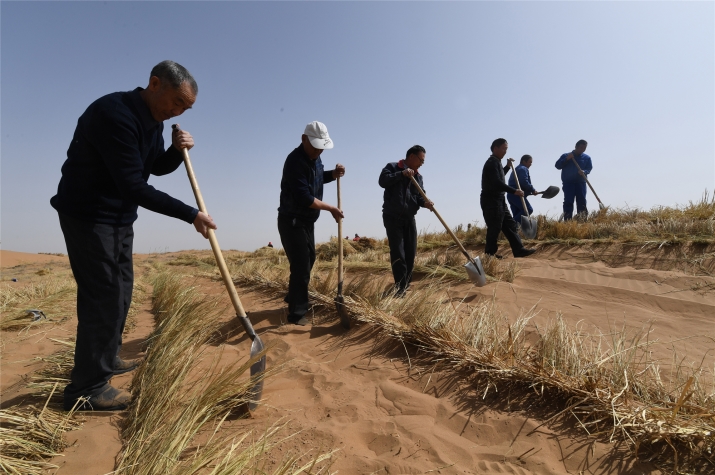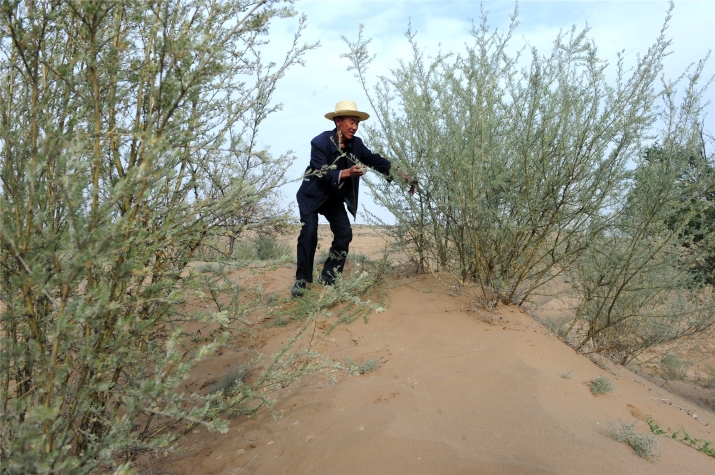|
||||||||||
| Home Nation World Business Opinion Lifestyle ChinAfrica Multimedia Columnists Documents Special Reports |
|
||||||||||
| Home Nation World Business Opinion Lifestyle ChinAfrica Multimedia Columnists Documents Special Reports |
| ChinAfrica |
| Ecological Endeavor |
| Three generations dedicated to desertification control in northwest China |
| By Xia Yuanyuan | VOL.11 June ·2019-06-05 |

The second-generation environmentalists work on Babusha Desert (XINHUA)
Few people may have heard of 67-year-old Guo Wangang, but his lifetime's work is of national importance. Working away from the spotlight, this committed environmentalist has a huge responsibility on his shoulders. He guards the Babusha Forest Farm in Gulang County in northwest China's Gansu Province.
Guo is not alone in combating desertification in the area. His father and five other local farmers began this initiative in the early 1980s. And now his son and increasing numbers of youth in the county are joining the group.
On March 30, the central authorities bestowed the title of "Model of the Times" on Guo and his farmer colleagues for their unswerving efforts to combat desertification and accelerate afforestation.
Over the past 38 years, Guo and the other farmers, who collectively span three generations, have transformed 14,467 hectares of desert through afforestation and kept 25,000 hectares of land off limits to allow trees and grass to regenerate. These efforts have turned their hometown into a livable green space from what was once an arid, inhospitable area where farmland and villages were long plagued by soil erosion.
Green pioneers
In the 1970s, Babusha, an enormous sand dune on the southern edge of the Tengger Desert covering around 5,000 hectares, gradually encroached south, threatening the county's social and economic development and the livelihoods of the people who lived in Gulang.
Shi Man wanted to change the situation. In 1981, the 56-year-old local farmer voluntarily took it upon himself to reverse the desertification.
It wasn't long before another five villagers joined in. After signing a contract with the local government, the farmers were allowed to grow trees in a 75,000-square-meter area to improve soil absorption and prevent the sand from spreading.
Birch and elm trees were planted in a checkerboard pattern, with a sand barrier to protect the soil. Given the harsh natural conditions, the saplings' survival rate was as low as 30 percent in the beginning.
However, Shi remained optimistic.
"As long as there is a living sapling, there is hope for our desertification control effort," he said. Faced with a sprinkling of surviving saplings, the six farmers were determined not to succumb to the desert's advances and become ecological refugees. This was a fight they had to win.
"At that time, my father, Guo Chaoming, and his five other fellow villagers did all the work voluntarily, despite the fact that they could not even feed themselves," said Guo Wangang.
More than 10 years later, the efforts of the six brave environmentalists paid off. The pace of desertification slowed down and grain output increased, with half of the Babusha sand dune being covered in thriving greenery.

Guo Wangang attends the trees in Babusha Desert (XINHUA)
Shrinking deserts
In the 1990s, the six farmers who started the desert greening work passed on the green baton to their next generation. Despite the difficulties in battle against the encroaching deserts, the second generation picked up the responsibility of their fathers. With shovels in hand, they continued the work of their fathers - planting trees to turn the sand dune into green land.
But the second generation of environmentalists realized that they needed to expand their team, as desertification control required many more hands than the six families could provide. "We decided to start a new business," said Guo.
In 2009, with Guo taking the lead, the farm, Babusha Luyuan Co. Ltd., was established. Guo and his team signed a contract with the local government to expand its afforestation project to another sand encroachment area at Heigangsha, Gulang County, 25 km from Babusha.
The farm introduced the concept of modern business management to encourage more local farmers to engage in desertification combat so as to have a stake in the farm in relation to their desertification control efforts. Apart from planting trees, the farm also promotes forestry and agricultural development to increase the income of farmers.
After several years of management and protection, Heigangsha is now covered with plants and flowers, and has become a habitat of wild animals such as yellow sheep and rabbits.
"Planting trees has successfully controlled encroaching desert. The windy weather in Babusha area has decreased and the sand line in Gulang has backed up by 15 km," said Guo.
Volunteer to professional
Another transformation of the second-generation environmentalists is to combat desertification with innovative and scientific methods, instead of traditional picks and shovels.
In 2016, the farm began large-scale reform, and put forward new ideas of scientific and innovative desertification control, such as employing remote sensing monitoring tools and techniques to observe sandy land changes and strengthen pest forecast.
Guo Xi, the grandson of Guo Chaoming, now the third-generation environmentalist, has inherited the mission of patrolling the forests. Every day, he drives a water bowser truck into the transformed area to water the trees and flowers and mo-
nitor the forest conditions through the use of remote sensing monitoring technique.
"We are now planning to build a road in this former desert to have easier access. I am filled with pride [in the legacy I am continuing] when I do my work," he said.
After almost four decades, thanks to the combined efforts of the three generations, the once desertification-threatened Gulang County has turned into a green corridor. It is now a vibrant forest farm, where produce is grown, sheltered under a canopy of greenery. More importantly, the grain output has grown significantly, according to Guo, leading to the increase of income of local farmers. The dramatic change has prompted more than 30,000 people from the surrounding areas to settle in the oncethreatened county.
(Comments to xyy@chinafrica.cn)
| About Us | Contact Us | Advertise with Us | Subscribe |
| Copyright Beijing Review All rights reserved 京ICP备08005356号-5 京公网安备110102005860号 |